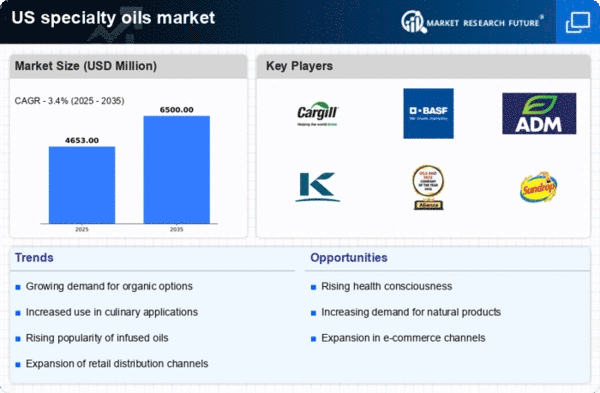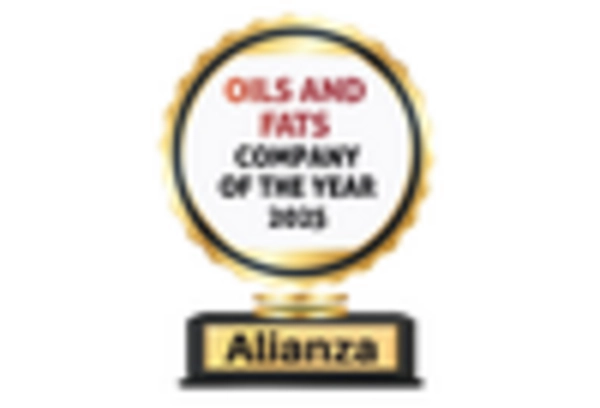Innovation in Product Offerings
The specialty oils market is characterized by continuous innovation in product offerings, which plays a crucial role in attracting consumers. Manufacturers are increasingly developing new blends and formulations that cater to diverse culinary needs and preferences. For instance, the introduction of flavored oils, such as garlic-infused or herb-infused oils, is gaining traction among consumers looking for unique taste experiences. Additionally, the rise of plant-based diets is prompting the development of specialty oils that align with vegan and vegetarian lifestyles. This innovation is not only enhancing the product range but also driving sales growth in the specialty oils market. As consumers seek out novel and exciting culinary experiences, the ability of manufacturers to adapt and innovate will likely determine their success in this competitive landscape.
Growing Interest in Home Cooking
The specialty oils market is witnessing a surge in interest related to home cooking, as more individuals are exploring culinary skills and experimenting with flavors. This trend has been fueled by the increasing availability of cooking resources, including online tutorials and cooking shows, which inspire consumers to try new recipes at home. Specialty oils are often highlighted as essential ingredients in these culinary explorations, as they can elevate the taste and quality of homemade dishes. Market data suggests that the home cooking trend has led to a rise in sales of specialty oils, with consumers seeking high-quality options to enhance their cooking experiences. As this trend continues, the specialty oils market is likely to benefit from the growing demand for premium oils that cater to the evolving preferences of home cooks.
Rising Demand for Natural Ingredients
The specialty oils market is experiencing a notable increase in demand for natural and organic ingredients. Consumers are becoming more health-conscious, leading to a shift towards products that are perceived as healthier and more natural. This trend is particularly evident in the food and beverage sector, where specialty oils derived from sources like avocados, olives, and nuts are gaining popularity. According to recent data, the market for natural oils is projected to grow at a CAGR of approximately 8% over the next five years. This growth is driven by the increasing awareness of the health benefits associated with natural oils, such as their high levels of unsaturated fats and antioxidants. As a result, manufacturers in the specialty oils market are focusing on sourcing high-quality, natural ingredients to meet consumer preferences.
Expansion of the Food Service Industry
The specialty oils market is significantly influenced by the expansion of the food service industry in the US. As dining out becomes more prevalent, restaurants and catering services are increasingly incorporating specialty oils into their menus to enhance flavor and appeal. This trend is particularly pronounced in gourmet and upscale dining establishments, where unique oils are used to create signature dishes. The food service sector is projected to reach a value of $899 billion by 2027, indicating a robust growth trajectory. This expansion is likely to drive demand for specialty oils, as chefs seek innovative ways to differentiate their offerings. Furthermore, the versatility of specialty oils allows for their use in various culinary applications, from dressings to marinades, thereby broadening their appeal in the market.
Increased Awareness of Health Benefits
The specialty oils market is benefiting from a growing awareness of the health benefits associated with various oils. Consumers are increasingly informed about the nutritional advantages of oils such as olive, coconut, and flaxseed, which are rich in essential fatty acids and vitamins. This heightened awareness is prompting a shift in purchasing behavior, with more consumers opting for specialty oils over traditional cooking oils. Market Research Future indicates that the demand for oils high in omega-3 fatty acids is particularly strong, as these oils are linked to numerous health benefits, including improved heart health. As a result, the specialty oils market is likely to see continued growth, driven by consumers' desire for healthier cooking options and the incorporation of these oils into everyday diets.
















